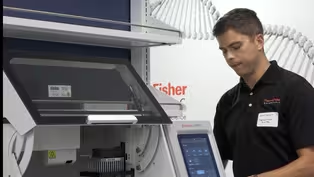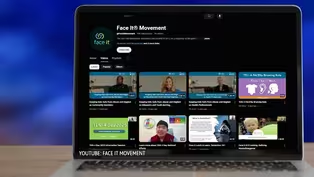
Groups Debate Increasing Funding for Public Education
Clip: Season 4 Episode 56 | 3m 35sVideo has Closed Captions
One group is asking state lawmakers to increase funding by more than $700 million.
A recent report from the Kentucky Center for Economic Policy says state education funding has not kept pace with inflation. Teacher unions and superintendents echoed the report last week, publicly asking for $718 million more in state dollars. But as June Leffler reports, other policy groups say more money alone won't improve education outcomes.
Problems playing video? | Closed Captioning Feedback
Problems playing video? | Closed Captioning Feedback
Kentucky Edition is a local public television program presented by KET

Groups Debate Increasing Funding for Public Education
Clip: Season 4 Episode 56 | 3m 35sVideo has Closed Captions
A recent report from the Kentucky Center for Economic Policy says state education funding has not kept pace with inflation. Teacher unions and superintendents echoed the report last week, publicly asking for $718 million more in state dollars. But as June Leffler reports, other policy groups say more money alone won't improve education outcomes.
Problems playing video? | Closed Captioning Feedback
How to Watch Kentucky Edition
Kentucky Edition is available to stream on pbs.org and the free PBS App, available on iPhone, Apple TV, Android TV, Android smartphones, Amazon Fire TV, Amazon Fire Tablet, Roku, Samsung Smart TV, and Vizio.
Providing Support for PBS.org
Learn Moreabout PBS online sponsorshipA recent report from the Kentucky Center for Economic Policy says state education funding has not kept pace with inflation.
Teacher unions and superintendents echoed the report last week, publicly asking for $718 million more.
But other policy groups say more money alone won't improve education outcomes.
Our June Leffler explains in this report.
State lawmakers cut public spending when the 2008 recession hit.
Public education funding has not rebounded since then, says Jason Bailey.
It would cost about $1.3 billion to get back to the level of funding we had even back then.
So we need to figure out where we can start and, the General Assembly has clearly identified that it can spend $718 million on reducing the income tax.
In fact, they've done it three times now just in the last few years.
So if $718 million can go for tax cuts through three rounds now, then surely one round of the same amount of money could go into our schools.
Bailey points to specific funding that disappeared in recent years, and there are specific earmarked items like, funding for textbooks and funding for professional development that have just gotten zeroed out.
And he says the state is not meeting its statutory obligation to fully fund transportation.
The cost of transportation has gone way up.
It's a lot more expensive to buy a bus now than it was ten years ago.
And it's harder to attract and retain, bus drivers who don't make a lot of money, and they can make more driving for U.P.S.
or doing something in the private sector.
So if we can't get kids to and from school, then we can't have schools.
But much of the money districts receive is flexible, and it's local superintendents and elected school boards to set their priorities, says Jim Waters of the Bluegrass Institute for Public Policy Solutions.
The local districts have gotten pretty much lump sums of funding to do what they wish to do with, and that that's, I think, an attempt by lawmakers to say to local districts, you're the best determiner of what is needed in your district.
You're the best ones to decide.
Do you need to give teachers a raise?
Do you need capital projects?
Do you need other programs?
The recent key policy report calls for funding to hire more staff, specifically teachers, bus drivers and school counselors.
Waters worries districts spend too much on positions outside the classroom.
We've had a tremendous increase in the central office, bureaucracy and paying non-teaching personnel.
Where do you what kind of return on investment do most taxpayers think that is?
Waters also calls for more district level transparency and accountability.
He points to Fayette County Public Schools, which has depleted its essential contingency account for reasons not yet known to the public.
Before we spend more dollars on K-12 education in Kentucky, we need more accountability on where the dollars have gone.
For Kentucky Edition, I'm June Leffler.
Thank you.
June.
Kentucky lawmakers will hammer out their two year budget in the 2026 legislative session.
One Republican that chairs the Senate Budget Committee called the recent spending request partizan and not worth consideration.
New Life Science Space Opens In Kentucky
Video has Closed Captions
Clip: S4 Ep56 | 3m 28s | LifeSciKY is in the new OneNKY Center in Covington. (3m 28s)
Raising Awareness About Child Abuse
Video has Closed Captions
Clip: S4 Ep56 | 4m 35s | Kentucky has one of the highest rates of child abuse and neglect in the country. (4m 35s)
Providing Support for PBS.org
Learn Moreabout PBS online sponsorship
- News and Public Affairs

Top journalists deliver compelling original analysis of the hour's headlines.

- News and Public Affairs

FRONTLINE is investigative journalism that questions, explains and changes our world.












Support for PBS provided by:
Kentucky Edition is a local public television program presented by KET

